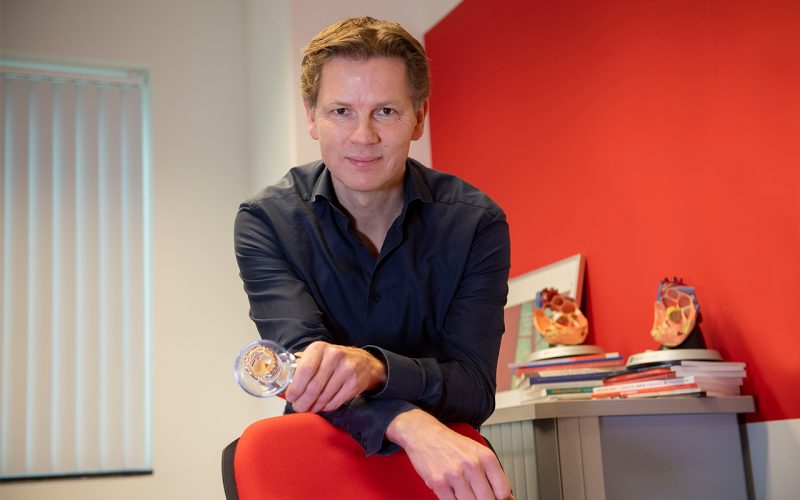Michiel Voskuil, interventional cardiologist, has been appointed professor of ‘percutaneous treatment of heart disease’ at Utrecht University’s Faculty of Medicine as of December 15, with his focus on congenital and acquired structural heart defects. In this new role, he focuses on improving care of structural heart defects in adults, advancing research and educating a new generation of cardiologists and nurses. “By combining knowledge and expertise, we offer patients the best possible treatment.”
Interventional cardiologist Michiel Voskuil focuses on percutaneous treatment in adult structural cardiovascular disease. “This is an innovative and minimally invasive technique where we can treat complex cardiac problems in the cardiac catheterization room through a small opening in the skin using X-ray,” he explains. “These procedures are less invasive for patients and provide a faster recovery than open-heart surgery. Especially for patients with congenital heart defects, who have usually had to undergo multiple open-heart surgeries in childhood, percutaneous treatment is often a valuable alternative. It is my mission to further improve the care of patients with complex heart conditions. For this, close collaborations between different disciplines and with other centers are crucial, so that we can pool knowledge and expertise and offer patients the best possible treatment.”
In addition to patient care, Michiel Voskuil has an important role in the field of scientific research. He leads projects such as the national multicenter PRO-TAVI study and the OUTREACH project, aimed at better treatments for patients with structural heart defects. He also coordinates national and international collaborations, such as integrating patient databases into the Dutch Heart Registry. “In addition, I focus on innovative technologies, such as percutaneous heart valve interventions and improving patient safety and cost-effectiveness in procedures such as a TAVI. This is the replacement of a severe aortic valve stenosis through the groin as an alternative to open-heart surgery.”
“For future research on congenital heart defects, collaborative projects are very important, as congenital heart defects are rare and diverse. For this reason, we conducted a project together with all centers treating congenital heart defects in the Netherlands to study the long-term outcomes of nearly a thousand patients with a narrowing in the aorta (“coarctation of the aorta”). Also, for research into more common conditions such as a degenerative aortic valve disease in older people, cooperation between centers is essential to demonstrate improved treatment methods with sufficient statistical power, as in the PRO-TAVI study.”
The new professor also plays a key role in the education of future (interventional) cardiologists, physician assistants and nurses. Through knowledge sharing and training, he prepares future healthcare professionals for the latest developments in healthcare. “In addition to training and supervising PhD students, I also organize courses for the Cardiovascular Education Institute (CVOI). The CVOI is the national educational institute for cardiovascular diseases and guarantees the quality and continuity of cardiovascular education in the Netherlands.”
The appointment of Michiel Voskuil strengthens the innovative position of UMC Utrecht in care, research and education. “I feel honored to contribute to innovative research and high-quality care in this role. I look forward to conducting innovative research and developing new treatments together with colleagues and partners over the next five years. Through excellent care, leading research and high-quality education, I want to create a better future for patients with structural heart disease.”
Michiel Voskuil studied medicine at the University of Amsterdam. He received his PhD from the Amsterdam University Medical Center (A-UMC) in 2003. His cardiology training and fellowship in interventional cardiology were also followed at the A-UMC. Since 2010, he has worked as a staff member of interventional cardiology at UMC Utrecht. He is further a board member of the science & innovation committee of the Dutch Society of Cardiology (NVVC) and is a member of the working groups Transcatheter Heart Valve Interventions (THI) and Congenital Cardiology of the NVVC.
